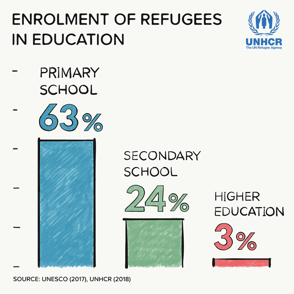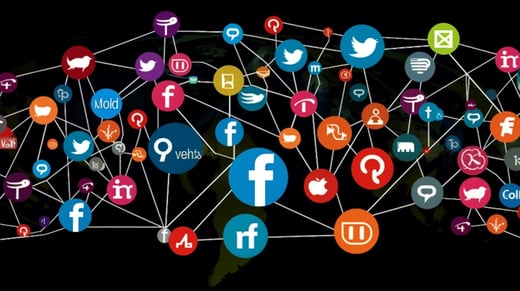Empowering Refugees Through Reskilling: A Pathway to Inclusive Workforce Integration
In a world that increasingly recognizes diversity and inclusivity as pillars of development, the topic of reskilling refugees has gained paramount importance. As nations and organizations strive to integrate refugees into the workforce, understanding the best practices for reskilling presents both challenges and opportunities. This blog aims to explore various aspects of reskilling refugees, mimicking the natural language queries people might use in search engines to ensure it addresses real concerns and improves findability.
How Can Reskilling Impact the Workforce?
Reskilling refugees is both a humanitarian action and a strategic approach for societal benefit. Programs like RefugeeForce in the Netherlands demonstrate the transformation potential of reskilling in the workforce. By training refugees as Salesforce specialists, the program not only assists these individuals in finding employment but also addresses crucial skill shortages in the local market, thereby enhancing the economy. This approach exemplifies how we can step up to connect the refugee community to meaningful job opportunities, reinforcing the workforce with necessary skills irrespective of their homeland.
The impact is multifaceted:
- Economic Contribution: Reskilled refugees can fill skill shortages in high-demand sectors, contributing to the economic stability of the host country.
- Social Integration: Employment is a key factor in the social integration of refugees, fostering a sense of belonging and reducing social tensions.
- Innovation and Diversity: Bringing diverse perspectives into the workforce can spark innovation and drive business success.
How Does Reskilling Solve Unemployment for Refugees?
Refugees often struggle to find employment in new countries due to unrecognized qualifications and a lack of local skills. Reskilling initiatives, such as the Salesforce program, help by offering relevant, skills-based training and facilitating the recognition of credentials, significantly aiding refugees to find jobs. These programs are crucial steps in connecting them to opportunity and overcoming barriers to integration into the workforce.
Effective reskilling programs typically include:
1. Skills-Based Training: Our program focuses on providing refugees in mature UNHCR camps with training that targets skills demanded by the industry, enabling them to connect to global opportunities.
2. Certification: We offer recognized qualifications that validate the refugees' new skills, ensuring alignment with international standards.
3. Career Guidance: We provide comprehensive guidance to help refugees navigate the job market and apply for suitable positions, acting as the last mile in their job search process.
4. Global Reach: Our aim is to support 2.5 million refugees by 2024, helping them reskill and adapt to new environments, including potential relocations to Switzerland or the EU.
5. Technological Integration: We incorporate artificial intelligence and automation to enhance the training process, preparing refugees to thrive in a technologically advanced world.
6. Sustainable Development: Our program is designed to help refugees invent a new future, integrating them into their new homelands and mitigating the impacts of displacement caused by natural disasters or other crises.
What Are the Best Pathways to Employment for Reskilled Refugees?
Once refugees are reskilled, the pathway to employment involves several strategic steps. Programs successful in this transition often incorporate robust support systems that include:
- Networking Opportunities: Programs that facilitate networking events or offer platforms for refugees to connect with potential employers.
- Partnerships with Local Businesses: Collaborations with businesses willing to employ refugees, which can lead to direct job placements.
- Mentorship Programs: Pairing refugees with mentors in their field can provide guidance and insider knowledge about the industry.
How to Create Inclusive Training Opportunities for Refugees?
Creating inclusive training opportunities means ensuring that programs are accessible to all refugees, regardless of their background or previous education. This involves:
- Flexible Scheduling: Offering courses during evenings or weekends to accommodate those who may have daytime commitments such as work or childcare.
- Language Support: Providing training in multiple languages or offering language support to help non-native speakers.
- Cultural Sensitivity: Designing courses that are culturally sensitive and inclusive, encouraging participation from all groups.
What Does an Equitable Reskilling Pathway Look Like?
An equitable reskilling pathway ensures that every refugee, regardless of their starting point, has access to the training and support needed to succeed. Key components include:
- Assessment of Skills and Needs: Starting with a thorough assessment to understand the individual's skills and needs.
- Personalized Learning Paths: Developing customized training programs that address specific gaps and leverage existing skills.
- Support Services: Providing additional support services such as counseling, childcare, and transportation subsidies to remove barriers to participation.
How to Ensure Inclusion in Reskilling Programs?
Ensuring inclusion in reskilling programs involves:
- Diverse Recruitment: Actively recruiting participants from various demographics, including women, older adults, and those from different ethnic backgrounds.
- Accessibility: Making sure that training venues are accessible to people with disabilities and that online platforms are user-friendly.
- Feedback Mechanisms: Implementing robust feedback mechanisms to continuously improve the inclusivity of the program based on participants' experiences.
What Role Does Reskilling Play in Workforce Inclusion?
Reskilling plays a crucial role in workforce inclusion by:
- Reducing Barriers: Diminishing the barriers that prevent refugees from entering the job market.
- Promoting Diversity: Encouraging diversity in the workplace, which has been shown to enhance creativity and innovation.
- Changing Perceptions: Helping change employer perceptions about hiring refugees, demonstrating their potential and reliability as employees.
Conclusion
The journey of reskilling refugees is more than just a pathway to employment; it is a transformative process that integrates diverse talents into the global workforce, fostering economic growth and social cohesion. By addressing the specific needs and barriers that refugees face, reskilling programs can offer more than just job readiness; they can provide a sense of community and belonging, enhance cultural integration, and break down the stigmas associated with displacement. As we continue to refine and expand these initiatives, it is crucial for policymakers, educators, and businesses to collaborate, ensuring that these programs are accessible, inclusive, and equipped to meet the evolving demands of the labor market. Ultimately, the success of reskilling refugees not only helps the individuals involved but also enriches our global society, making it more diverse, innovative, and resilient. By fostering an environment where everyone has the opportunity to thrive, we build a stronger, more inclusive future for all.
FAQ
1. How does stepup.one contribute to the empowerment of refugees in mature unhcr camps through social media marketing and connecting them to global opportunities?
stepup.one is dedicated to the empowerment of refugees, particularly those in mature UNHCR camps, by integrating social media marketing and connecting them to global opportunities that pay. Through targeted education and training programs for refugees, stepup.one provides refugees with marketable skills necessary for the digital age. This initiative not only helps in rebuilding their lives but also in enhancing their employability in the global market.
2. What is the priority for programs designed to help refugees rebuild their lives in refugee camps, and how does stepup.one execute these programs?
The priority for programs aimed at helping refugees rebuild their lives in refugee camps is to provide comprehensive education and training that fosters both personal and professional growth. stepup.one executes these programs by deploying a step by step guide that includes hands-on experience in social media marketing and connecting refugees to opportunities that pay, thus giving them hope and a pathway to sustainable livelihoods.
3. In what ways can anyone of us step up to support the extension of your social media team to include refugees from UNHCR camps in social media marketing?
Anyone of us can step up by giving refugees an extension of your social media team, especially those from unhcr camps in social media marketing. This can be achieved by incorporating refugees into school digitisation projects or by enabling them to manage an ad portfolio. By doing so, we provide them with a practical education that integrates them into the workforce and helps generate real results for businesses.
4. How does the completion of a 2-year program at stepup.one ensure refugees and connecting them to global opportunities that pay?
The completion of a 2-year program at stepup.one is crucial in preparing refugees and connecting them to global opportunities that pay. This comprehensive timeframe allows for in-depth training in critical skills, such as social media marketing and other industry-specific skills, ensuring that upon completion, refugees are well-equipped to find jobs that offer rewarding payment and contribute positively to their new communities.
5. What role does giving them a job – it’s easy – just give them your hashtag play in empowering refugees through stepup.one?
Giving them a job – it’s easy – just give them your hashtag is a slogan that encapsulates the essence of stepup.one’s mission to simplify the process of empowering refugees by making them a visible and active part of the online community. By assigning specific hashtags, organizations can highlight and track the contributions of refugees, effectively giving them hope and recognition while promoting the sustainability of the program.
May 15, 2024



Comments